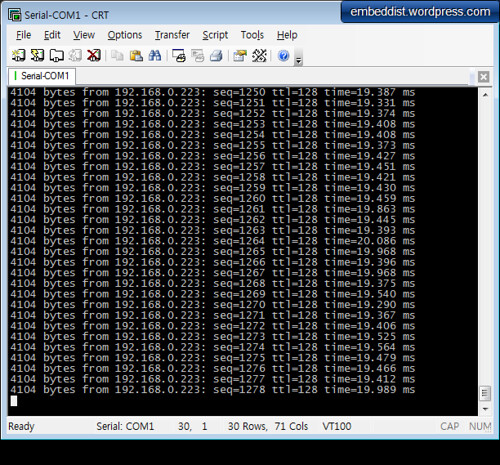Linux Kernel Serial Port Buffer Size In Logic
Page 175 of the soc PDF says: 16x8 transmit 16x12 receive Beware that there are scheduling delays for interrupts so you should scale your baud-rate so that the buffers don't fill when interrupt handler is delayed. Knights of the zodiac english dub. Typically 115200 baud should work with no loss - that would mean worsted case about 1ms to fill the 16 byte buffer. So the interrupt-handler should be able to handle that. But that assumes an otherwise idle system. If you run CPU-intensive tasks you will get further delays.
Jan 21, 2009 How to increase the serial transmit buffer size in. I've looked in the kernel code (linux drivers char serial.c). Data from serial port into a buffer. How to change read buffer size of linux serial line? (running linux with kernel 2.4). Browse other questions tagged linux serial-port buffer or ask your own.
So design your system/select your baud-rates with that in mind! Either low baud rates or make sure your messages are smaller than those 16 bytes and then don't sent messages back to back, which could trigger an overflow. In the end it might be better to use a serial USB adapter, as these typically have bigger buffers - in the range of 64 bytes or so. Maybe this could be the problem. I've been using this serial class: And a baud rate of 19200 When I call the serial read function from the above class, it will read until the buffer is empty - but for that there has to be some data in the buffer to start with. So initially I was sending my 'read' command, through the UART TX lines, then pausing for 45mS, then issuing the read command.
The response from the RFID reader is of the form: AA BB 02 In this case the data being read is the UID of a mifare card. Looking at the standards: this UID can be either 4,7,or 10 bytes, depending on the age of the card. If it is 4 bytes, then the length of my received data is 9 bytes - and fits in the buffer If it is 7 bytes, then total length is 12 If it is 10 then total length is 15 In each case it looks like the received data should fit in the buffer, especially since the buffer is always read before any other further commands requesting data are sent. I have also confirmed that all my cards are using 4 byte UIDs anyway.
Linux Kernel Source

Linux Kernel Code

I will try taking out, or at least massively reducing, that 45mS delay though, as it seems to be asking for trouble. Why don't you run blocking io on the serial without any delays - if you wait with sleep or if you wait for io does not make a difference. Anyway: linux has an additional data buffer - whatever that size is. The other thing is: what parts of the data is missing? At the beginning, at the end or individual bytes in between when running the same operation with the same card?
If it is the individual bytes case, then i would check your wiring. Also look at the communication with an oscilloscope or logic analyzer to see how the data arrives really. Cheers - that worked It's not the buffer after all. For some reason some cards just don't behave with that reader - though they are the same type as others, and work fine on other readers. Oh well Quick related query: using bash scripting, I can send data to the serial port as suggested above I can also read from the port using cat However, if I do a write followed by a read, the cat doesn't return any data. I assume this is because it is reading from the port directly rather than from a buffer.? If I have the cat command running in another terminal at the time the echo is used to issue a request to the serial port, the cat works fine.
Code: exec 3.